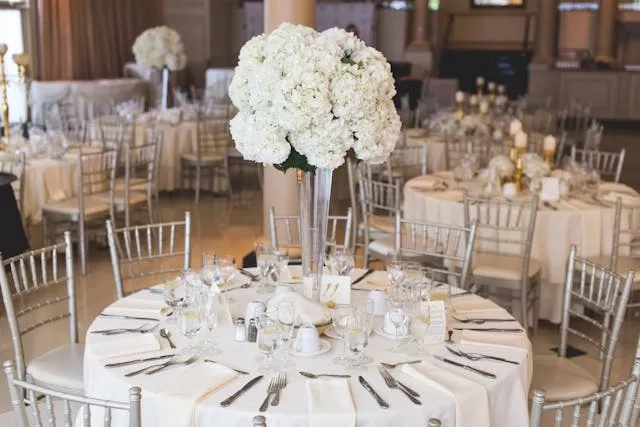Event Planning Tips: Essential Steps For A Successful Event
To plan a successful event, you need to coordinate carefully with a clear vision and pay attention to the details. Whether you’re preparing for a corporate function, a wedding, a trade show, or anything else, you must take the appropriate steps to ensure a seamless and memorable experience for guests. From choosing the right venue and managing logistics to designing captivating tablescapes, every decision plays a part in the event’s overall ambiance and flow.
In this post, we offer some essential event-planning tips to help you stay organized and create an occasion to remember.

Key Takeaways
- Outline your event’s goals from the outset and set a realistic budget to help guide decisions on the venue, catering, decor, and other key considerations.
- Organize tasks with a detailed timeline and checklist. This will help keep on top of vendor bookings and logistics to avoid last-minute issues.
- Prepare for event day thoroughly by conducting final equipment checks. Establish contingency plans, coordinate staff roles, promote the event, and arrive early on the day.
- We supply high-quality custom polyester table covers and can also create an array of other customized materials to help with branding and ambiance at your event at competitive prices.
Tips On Planning An Event
Statistics show that in-person meetings are the predominant format for events, and this extends to different types of events. Planning a successful event requires a solid combination of foresight, organization, and attention to detail. Thorough preparation is fundamental to your strategy, so start early and give yourself plenty of time to finalize everything.
Here are some key tips for event planning:
- Start by defining the event’s purpose and setting a budget. This will help guide your decisions regarding venue, catering, and decor.
- Create a detailed timeline that includes booking vendors, sending invites, and confirming logistics. It’s important to communicate with vendors regularly.
- Pay attention to the guest experience. Flow and ambiance are important, particularly in seating arrangements and table decor.
- Consider the best tablecloths for events, and incorporate things like runners and centerpieces to elevate the space with the right tone.
- Always have a contingency plan. If you try to predict potential challenges and provide some strategies and budget to address them, you can adapt quickly and keep things on track.

Why Is Having A Checklist Crucial For Successful Event Planning?
Having a checklist can make or break your event planning because it organizes your activities and ensures no detail is overlooked. There are many moving parts involved in event planning, from securing a venue to hiring vendors and coordinating decor, catering, and more. With a checklist, you can break these things down into manageable steps, which makes it easier to prioritize and stay on track.
If you have a detailed checklist, you are also less likely to encounter last-minute surprises. Give yourself a clear overview of what needs to be done, along with deadlines, to avoid the stress of forgotten tasks. This way, you won’t need to worry about forgetting to get your full-color sublimation lanyards printed or booking the right waste disposal service as you track progress and delegate responsibilities.
A checklist also helps keep you aligned with your budget and goals for the event. Book entertainment, order custom tablecloths, and confirm transportation with confidence, moving smoothly and efficiently toward a successful event.
What Are The 5 P’s In Event Planning
The 5 P’s of event planning are Purpose, People, Place, Planning, and Promotion. They are all essential elements that guide the process of organizing a successful event.
- Purpose: The purpose of your event is fundamental to everything else. Is it a corporate meeting, wedding, trade show, or something else? Understanding this helps shape decisions like the event format or the tone of the decor.
- People: Understand your guests when planning your event. Think about their needs, preferences, and expectations to tailor the event’s theme and activities to them.
- Place: The venue plays a key role in creating the right atmosphere and functionality. Consider the size and layout of your venue, as well as its location, to ensure it aligns with your goals.
- Planning: Attention to detail is key here. Most tips on event planning revolve around organizing logistics, vendors, timelines, and contingencies to ensure smooth execution.
- Promotion: Effective promotion ensures your event reaches its intended audience. Marketing strategies in the build-up are important, and you can use things like customized table runners at the event to promote your brand to attendees.
Make a statement with out custom table covers!
Are you ready to stand out at your next event?
Order now and elevate your brand with our high-quality, personalized table covers.
How Can You Organize An Event Effectively?
Around 65% of consumers understand a product or service better when they experience it through live events. But you must organize that event well to make it a success. Here are some tips for planning a successful event for effective organization:
- Select the right venue: The space should accommodate your guests, match the event theme, and provide the necessary amenities.
- Set a realistic budget: With a well-planned budget, you have a guide for decisions on venue, decor, entertainment, and more with overspending.
- Coordinate your team: Assign and delegate tasks to a reliable team, maintaining clear communication at all times.
- Create a timeline: From booking vendors to venue setup, a detailed timeline helps keep you on track, and you can review progress regularly.
- Have a contingency plan: Issues will inevitably arise, and you should attempt to predict them and have backup plans and budget in place to adapt quickly.
Tips For Choosing The Right Venue And Effectively Marketing Your Event
Successful event planning revolves around getting the right venue, as this will set the tone for the entire experience. Here are some successful event planning tips relating to venue and marketing:
- Consider size and layout: Your venue needs to comfortably accommodate your expected guest count while providing the necessary facilities and amenities. The venue location should also be convenient for attendees, with good parking and public transport options.
- Venue ambiance: The venue should be a good fit for your event’s theme. A corporate event may require a sleek, professional setting, while a wedding will call for a more romantic or intimate atmosphere. Make sure the venue supports your entertainment or technology needs adequately.
- Marketing: Develop a promotional strategy that will reach your audience effectively. Digital platforms, social media, and targeted email campaigns will spread the word. You could offer early-bird discounts or exclusive incentives to drive attendance and create custom-printed tablecloths and more to ensure consistent branding at the event itself.

How to Effectively Market and Promote Your Event
You should prioritize effective marketing and promotion of your event, and this takes a strategic approach to attract attention and engage your target audience. Here are some tips:
- Create compelling invitations: Whether digital or physical, your invitations should align with the event’s theme and purpose. Use visually appealing designs and clear messaging with a strong call to action. Make sure essential details are included and highlight entertainment or keynote speakers to spark interest.
- Leverage social media: This is a siple way to expand your reach. Create event pages, share countdowns, and post engaging content that will drum up interest in your event. Hashtags and paid social media posts can also be helpful.
- Incorporate email marketing: If you have a strong email list, you can use this for direct communication with potential attendees. Personalized emails, early-bird promotions, and reminders can boost engagement.
- Collaborate: Partners and influencers who align with your event goals can leverage their audiences to raise awareness of your event.
- Branding: All digital materials should feature consistent branding. This should extend to the event itself, so use things like our custom tablecloths with logos and matching custom cork coasters to create a strong look on the day.
Promote your brand with our custom table covers!
Ready to make a lasting impression at your next event?
Order now and showcase your brand with our eye-catching, personalized table covers.
Make Your Custom Table CoversChallenges You Might Face In Event Planning
There are several inevitable challenges with event planning which might require some swift problem-solving. The most common issue is managing unexpected problems, like technical malfunctions or weather disruptions. We recommend that you have contingency plans in place for these situations to prevent them from derailing the event.
Challenges can also arise from coordinating with vendors. Delays and misunderstandings can have an impact on the event’s flow. Emphasize clear communication, written agreements, and frequent check-ins to ensure everyone is on the same page regarding expectations.
Another hurdle is staying on budget. Without careful planning and monitoring, costs can escalate quickly. A detailed budget and prioritized spending can help ensure you keep costs under control. You should also prepare thoroughly for details like the presentation, like optimal tablecloth drop length, to ensure there are no unexpected issues with tables on the day.
How to Prepare for Event Day
It takes meticulous planning and attention to detail to prepare for event day. Here are some event planning tips and advice to help you:
- Conduct final equipment checks: Do this on the eve of the event. Ensure that all lighting, sound systems, and AV equipment are working properly. Test microphones, projectors, and other essential technology.
- Have a backup plan: You should have pre-prepared contingency solutions for things like weather disruptions or vendor delays. Make sure your team knows these plans and is ready to adapt if a problem arises.
- Coordinate your staff: This is key to a smooth event. Hold a final meeting to go over the event timeline, assign specific roles, and confirm everyone fully understands their responsibilities on the day. Identify who people can report to in case of issues.
- Arrive at the venue early: This is crucial to ensure you can handle last-minute details like seating arrangements and getting wrinkles out of table covers. Be proactive to achieve a seamless event and give yourself the flexibility to meet challenges head-on.
What Should You Consider When Wrapping Up An Event?
When you wrap up your event, there should be a debriefing session with your team to evaluate the overall execution and look for areas for improvement. Gather all team members to hold a structured debrief meeting shortly after the event so all feedback is fresh and relevant.
- What went well? Start with the positives. Highlight successes and effective strategies to understand what contributed to a smooth execution. Take the time to recognize the contributions and achievements of team members.
- What didn’t go to plan? Analyze issues or challenges that arose, like vendor issues, logistical problems, or unforeseen disruptions. Encourage constructive feedback to understand why things happened in order to avoid repeats in subsequent events.
- Document everything: Insights and suggestions should be compiled into a post-event report. Include actionable recommendations to improve processes and outcomes in the future. This report will be an important reference point for future events.
You will also need to think about the clean-up and practical considerations like how to store table covers or where to recycle disposable equipment.
What Are The Best Practices For Following Up With Guests?
Follow up with guests after the event to maintain relationships and gather valuable feedback. A timely follow-up should be your first port of call. Reach out within a few days to express your gratitude for their attendance with a personalized thank-you note or email, reinforcing your appreciation and keeping your event in the conversation.
Consider incorporating a feedback request, designed ahead of time as part of your event planning. A brief survey or questionnaire can be effective to gather insights on guest experience, including what they enjoyed and what needs improvement. This will help you refine future events and understand guest preferences.
We also recommend that you offer post-event content. This could include things like:
- Photos
- Highlights
- Event recaps
It will provide value and keep guests engaged with your brand or organization.
Finally, take the opportunity to maintain ongoing engagement. Invite your guests to future events, share updates, and offer some special promotions. This will help build lasting relationships and encourage continued involvement with your brand or organization.

Attract attention and make a statement at your next event with our high-quality, personalized table covers.
Showcase your brand with our custom table covers!
Order now and promote your brand in style.
Frequently Asked Questions About Event Planning Tips
What Are Some Tips On Planning An Event?
Define the event’s purpose and set a realistic budget. Create a detailed timeline with a comprehensive checklist. Pay attention to the guest experience and have a contingency plan for unexpected issues.
How Can You Make An Event Successful?
It is crucial to select the right venue and ensure your budget is realistic. Coordinate your team and have a solid contingency plan. Then focus on marketing, branding, and ensuring a positive guest experience for best results.